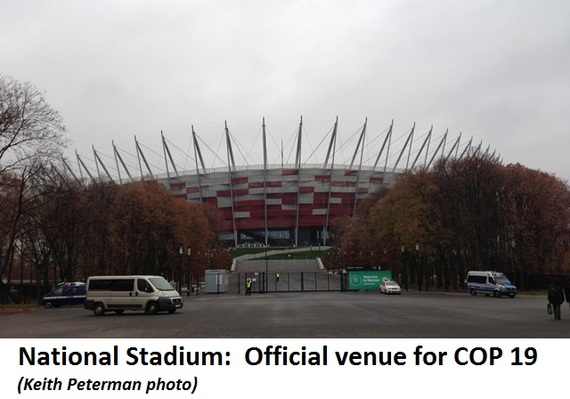Greetings from Warsaw! I'm in Poland to observe and report on the UN climate conference (UNFCCC COP19), and I'll confess that it was a surreal moment when I collected my luggage and stepped onto Polish soil this past Saturday.
The last time I passed through customs at the Warsaw airport, it was May 1989, and I was emerging into a communist nation trapped behind The Iron Curtain. Much has changed here over the last 20+ years, but the gray clouds that have shrouded Warsaw for these past several days are a reminder of the former monochromatic moods and monotones of communism.
Little did I realize in 1989 that the summer would offer me a front-row seat for an unprecedented political drama -- indeed, it would lead to one of the 20th Century's most historic turning points. It was the "Summer of Solidarity," and the engagement and activism that took place in civil society led to an inconceivable outcome by year's end.
Fast forward to 2013, and the "Summer of Solidarity" may be an apt metaphor for addressing the oppressive global issue of climate change.
In 1989, I had received a U.S. National Academy of Sciences research grant to serve as an exchange scholar at the Polish Academy of Sciences in Warsaw. My wife and four children shared the living experience with me, and it was a challenge to say the least. We lived in a non-descript, gray, apartment building, one of many in a confusing labyrinth of similarly non-descript structures. It didn't take us long to learn the odd calculus of Soviet-era utilities. Rather than the "all-or-nothing" power arrangements we're used to in the west, electricity was frequently passed from one service to another; if the elevator wasn't working, that was a good sign -- we might have hot water!
All goods were scarce, including food. We all carried a pocket full of zlotys -- the local currency -- to purchase anything reasonably edible if the opportunity arose. If they came across anything on the black market that we might want, even our youngest knew to buy six (one for each of us) if they could. In any case, we could expect to wait in a long line for anything of value.
I still recall my first day walking into the lab, thinking "I'm going to die!" when I saw the conditions. That wasn't hyperbole, either. At a casual glance around my lab I saw sodium (or maybe it was potassium, there was no label on the bottle) sitting right next to the sink. It didn't matter which element it was. Either would have reacted violently with water if the bottle had been accidently knocked in to the sink -- check out this YouTube video to see what I mean. Looking more closely, I saw that very few vessels had labels, and those that did were scribed in Polish. There were open vats of mercury (heavy metal toxicity), the coffee was brewing next to flasks of refluxing organic solvents... you get the picture.
For all the challenges of our living situation and the liabilities I faced in the laboratory, it was an experience I would never trade. Clearly, the system was broken, but all of that was about to change.
Slowly, repression and despair were giving way to hope. What had started as a small resistance in the shipyards of Gdansk had morphed into a mass movement of 'Solidarity'. The voice of a people seeking democracy challenged the grim authoritarianism they had lived under since the Iron Curtain had been drawn.
Through that summer, civil unrest and campaigns opposing one-party rule in Poland and other eastern bloc nations ignited spontaneous unrest. Few if any of those watching these geopolitical shifts would have anticipated at the beginning of 1989 that by year's end, the most visible physical symbol of The Iron Curtain, the Berlin Wall, would be reduced to so much rubble. Within two years, the "The Evil Empire" of the Soviet Union had dissolved. The power of the people threw off the shackles of authoritarian regimes.
Today, I see many of those formerly gray buildings painted in pastels and a variety of more subdued colors. Yes, the climate in Poland today is quite different than it was back in 1989. That is, the political, economic, and social climate is much improved.
The climate, as it relates to our atmosphere, however, is far, far worse.
Right now, leaders from around the globe are gathered in Warsaw. Over these two weeks they hope to forge agreements that will confront the repressive, civilization-challenging issue of climate change.
As the negotiators, party members, observers, and press walked into the conference center for today's first day of meetings, I expect that many of them understand the great challenges before them.
The momentous events that transformed all of Eastern Europe and the former Soviet Union in the aftermath of the "Summer of Solidarity," however, show that meaningful, decisive change can make a difference if the people -- you, me, your children, parents, grandchildren, grandparents, cousins, aunts, uncles, and friends -- demand it.
